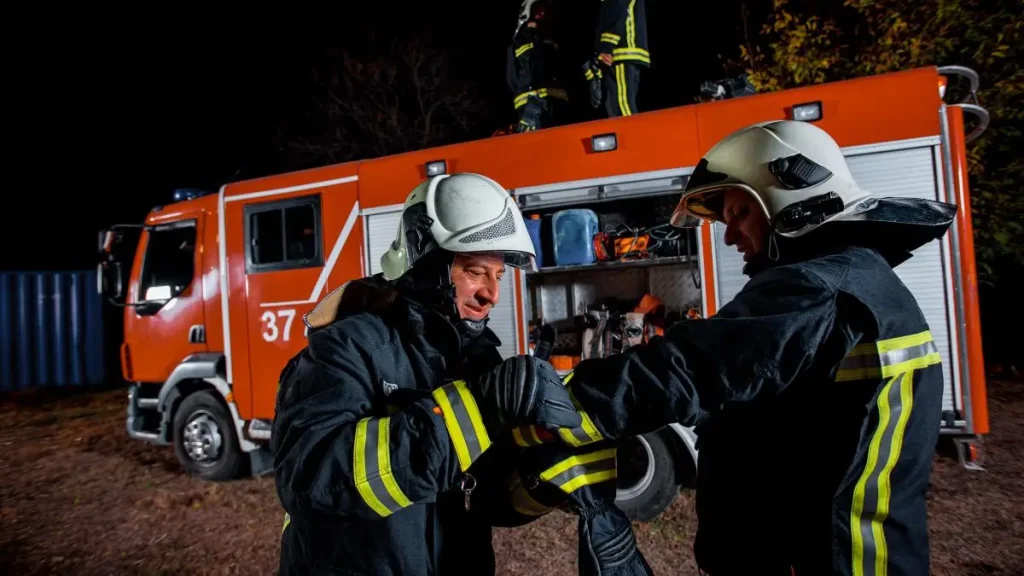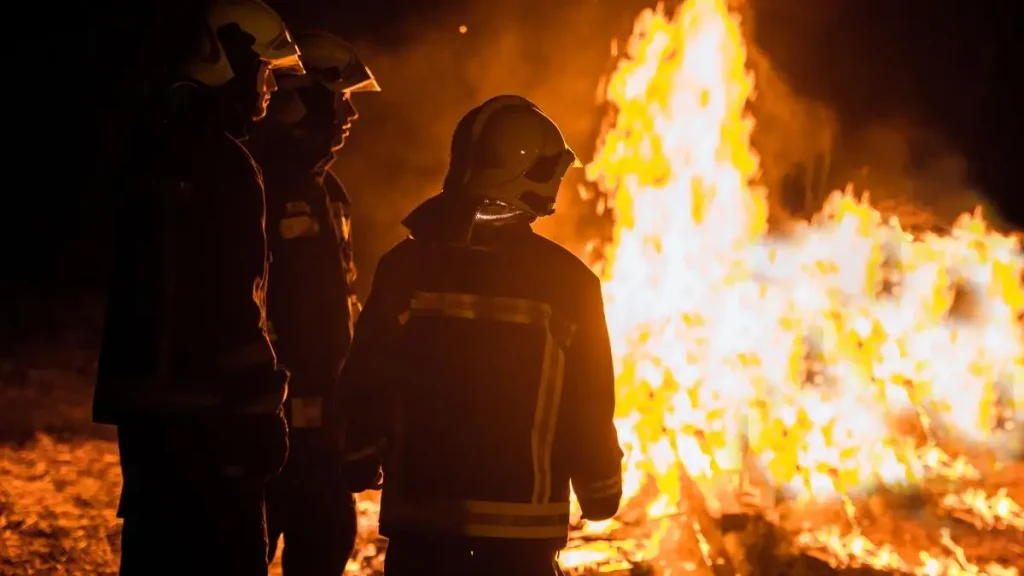Peoria Fire Crews Rescue Cat, Displace Four After East Bluff Home Fire
I can only imagine the panic that hit that family Tuesday evening in Peoria’s East Bluff—when smoke started pouring through their two-story home. It was just after 8 p.m., and all four of them—one adult and three kids—were inside when the fire began.
Thankfully, they made it out before firefighters arrived. That quick escape likely saved their lives.
The house, on the 700 block of E. McClure Avenue near North Wisconsin, was already filling with heavy smoke when crews pulled up. A fire had broken out upstairs, and while flames didn’t spread beyond one bedroom, it was serious enough to displace the entire family. What hit even harder? Their cat was trapped inside.
Crews found the pet, got it out, and gave it oxygen on the scene.
No one was hurt. But the emotional impact—and the $50,000 in damage—won’t be easy to bounce back from.
What Happened That Night in East Bluff?
It started like any ordinary evening. But around 8:20 p.m., everything changed for a family living in Peoria’s East Bluff.
I read on 25 News Now that the fire broke out in a two-story home on the 700 block of East McClure Avenue, near North Wisconsin. Inside were one adult and three kids. No firefighters on scene yet. No alarms blaring outside. Just the family realizing—something was seriously wrong.
The good news? They got out in time. Every one of them made it out safely before help arrived. But not everyone was accounted for yet. Their cat was still inside.
When I picture that—trying to grab your essentials, your kids, and realizing your pet’s still in the house—it hits hard. Fires move fast. Seconds matter. And that night, they barely had enough of them.
Fire Crews Move Fast — and Save a Life with Oxygen

By the time firefighters got there, thick smoke was already pouring from the second floor.
I’ve covered enough fire incidents to tell you: five minutes might not sound like much, but when your home is burning, that’s forever.
According to Battalion Chief Josh Martin, crews had the flames out within five minutes of arrival. That kind of response makes all the difference between a total loss and a chance to recover.
And here’s the part that got to me—once the flames were under control, the crew didn’t stop. They went back in and rescued the family’s cat.
Gave it oxygen on the scene. That kind of care goes beyond the job description. But it matters deeply to people who just lost so much in minutes.
Similar quick-response cases, like this Tybee Island home fire that sent one person to the hospital, show just how critical those first few minutes can be.
The Fire’s Cause: Electrical Issue in the Bedroom
We now know what started it.
The fire was contained to one bedroom upstairs, and investigators found the cause to be an electrical problem in that room. That’s what Chief Martin confirmed.
And if you live in an older house—or even rent one—you need to hear this. Electrical fires are one of the most common causes of house fires. It’s not always dramatic like a stove left on. Sometimes it’s a short in the wiring, a damaged outlet, or a cheap extension cord that overheats behind the couch. You may not even notice until it’s too late.
That’s why I always say—don’t ignore flickering lights or that buzzing outlet. It’s never “just nothing.”
Just last month, an Indiana resident escaped with minor injuries — all because their smoke alarm failed during a late-night fire.
The Cost: $50,000 in Damage and a Lost Sense of Home
Fifty thousand dollars.
That’s the estimated damage from this fire—and it was only one room. When you think about it, the numbers add up quickly: drywall, smoke damage, flooring, clothes, personal items, everything.
But let’s be real: it’s not just about the money. It’s about suddenly having no place to go. No routine. No beds for your kids tonight. No comfort in the walls you once felt safe in.
As someone who’s seen families go through this, I can tell you: the emotional toll lasts long after the flames are gone. You’re left standing outside, watching everything you built be carried out in black trash bags.
Have you or someone you know ever dealt with a home fire? Drop your experience in the comments — your story might help someone else stay prepared.
Red Cross Steps In — Here’s How They Help Families Like This
That’s where the American Red Cross comes in.
They showed up that night, and they’re now helping the family with temporary housing. It’s what they do—step in when everything else feels like it’s falling apart. Lodging, basic necessities, sometimes even financial aid. That support is often what carries a family through the first 48 hours when the shock hasn’t even fully set in.
If you’re ever in a situation like this (and I hope you’re not), knowing that help exists matters. And if you’re someone who wants to help others, this is the kind of work worth supporting—quiet, consistent, life-changing.
If you’re the kind of person who wants real-time home safety updates and fire incident alerts, there’s a WhatsApp channel quietly curating that — I’ve found it genuinely useful to stay aware without the noise.
This Isn’t the First Fire in East Bluff — And That’s the Bigger Problem

If you’ve been following local news lately, you’ll know this wasn’t some isolated incident. East Bluff has seen more than one house fire in the last few months. And every time I read about another one, I find myself asking the same thing: What’s going on with the housing conditions here?
These homes are often older. Some haven’t had their electrical systems updated in decades. You and I both know what that means—faulty wiring, outdated fuse boxes, and overloaded circuits.
When that becomes the norm, it’s no longer “just bad luck.” It’s a pattern. And if you live in East Bluff or similar areas, it might be time to ask: Has your home been checked? Is your family safe?
In St. Louis, an overnight fire in Holly Hills turned deadly, reinforcing the need to address aging electrical systems in older neighborhoods.
Don’t Wait for a Fire — Here’s How You Can Protect Your Own Home
Let’s get practical for a second. If you’re reading this and thinking, “Damn, that could be us,” you’re not wrong.
So here’s what I’d do right now if I were you:
- Check your smoke alarms. Test them. Make sure you have one in every bedroom and hallway.
- Don’t overload outlets. If you’ve got six things plugged into a cheap extension cord, fix that today.
- Hire a licensed electrician. Even if it costs a bit, get your system inspected—especially if your home is older than 30 years.
- Plan your exits. Sit with your family and walk through what you’d do if a fire started in the middle of the night.
- Have a pet plan. I’ve seen too many pets lost in fires because no one planned for them.
We don’t think it’ll happen to us. Until it does.
What Happens Next for the Family — and How You Can Make a Difference?
Right now, the family is staying somewhere temporary. Thanks to the Red Cross, they’ve got shelter and a bit of breathing room. But what comes after that? Rebuilding. Insurance paperwork. Replacing basic things like clothes, school supplies, furniture.
If you’ve ever started over from zero, you know how exhausting that can be—especially with kids.
This is where community matters. If there’s a fundraiser, a local church drive, or even a neighbor collecting donations, that small gesture makes a huge difference. And if you can’t give? Even just checking in, sharing their story, or helping raise awareness does something real.
Because let’s face it—we all hope someone would do the same for us.
For more real-life home fire reports and safety insights, visit our Home Security section.
Disclaimer: This article is based on publicly available news reports and official statements at the time of publishing. Details may evolve as investigations continue. For emergency assistance or verified updates, please contact local authorities or fire services directly.


